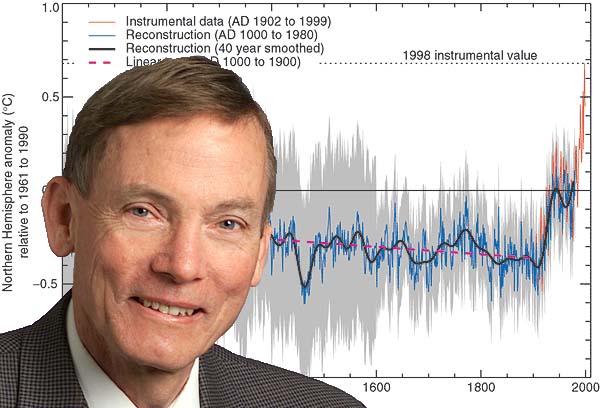
Dit is het vijfde deel van mijn ‘posting’ over het interview met William Happer op de website ‘TheBestSchools’, waarin Happer zijn opvatting over de klimaat’problematiek’ ontvouwt. De eerste vier delen zijn hier, hier, hier en hier te vinden.
Happer’s visie komt dicht bij wat als consensus onder de klimaatsceptici kan worden beschouwd. Inmiddels is hij bij Donald Trump in diens ‘Tower’ op bezoek geweest.
Het is derhalve aannemelijk dat zijn klimaatvisie als inspiratiebron, zo niet leidraad voor het klimaat- cum energiebeleid door de nieuwe Amerikaanse regering zal worden overgenomen. Reden te meer om er uitvoerig aandacht aan te schenken.
Na de behandeling van het verzekeringsargument informeert de interviewer naar Happer’s opvatting over de beruchte hockeystickgrafiek.
William Happer
The hockey-stick temperature record was conspicuously absent from the latest IPCC report, which speaks volumes. My guess is that the hockey stick started out as an honest but mistaken paper, but one welcomed by the global-warming establishment. They had been embarrassed for years by the Medieval Warm Period, when Vikings farmed Greenland, and when emissions from fossil fuels were negligible. A.W. Montford’s book, The Hockey Stick Illusion (Anglosphere Books, 2015), is a pretty good summary of what happened (see this review).
As you can learn from the book, much of the Hockey Stick was based on growth rings from a judiciously chosen collection of trees. If you use other temperature proxies, for example 18O to 16O isotope ratios in carbonates, like the stalagmites of caves, borehole temperatures, lake-bottom pollen, alkenones, etc., you see a clear Medieval Warm Period, in agreement with historical data. A temperature record from more reliable proxies that do not include tree rings is shown in the figure below, taken from C. Loehle and J.H. McCulloch, “Correction to: A 2000-year temperature construction based on non-treering proxies,” Energy & Environment, 2008, 19: 93–100):
Non-Tree-Ring Proxies
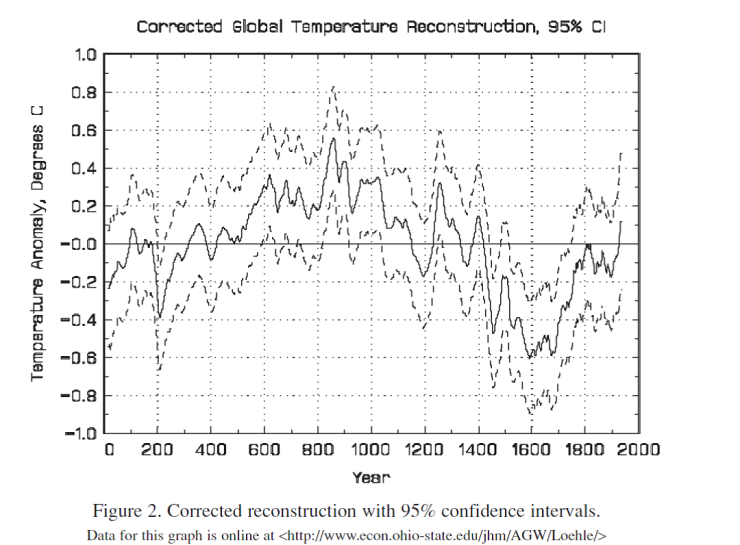
A 2000-year record of temperature using non-tree-ring proxies. [Source: Energy & Environment]
NOAA’s recent attempt to eliminate the hiatus is an example of the same kind of thinking that went into the hockey stick. If a politically correct theory does not agree with observations, revise the observations.
Vervolgens informeert de interviewer naar Happer’s opvattingen over de invloed van andere factoren dan CO2 op de opwarming die sinds 1850 heeft plaatsgevonden.
William Happer
Yes, there has been a rapid increase of CO2 in the past century, and it has already made a contribution to increased agricultural production. And yes, there has been warming, about 1° C, but with half the warming occurring before there was much increase in CO2. The erratic nature of the warming over the past century suggests that half or more of the warming is not due to more CO2, but has been caused by other natural phenomena, which have caused warming or cooling over all of geological history.
En dan volgt een uitleg van de Milankovic hypothese, die een verklaring biedt voor de ijstijdencyclus van zo’n tienduizend jaar. Maar daarnaast dient men ook rekening te houden met kortere perioden van temperatuurverandering als gevolg van fluctuaties in zonneactiviteit.
Happer:
The medieval warm period, the little ice age, and the current warm period are too short to ascribe to orbital changes, but they do suggest some sort of solar influence.
A sketch of the Maunder minimum of sun spots that you mention is shown below.
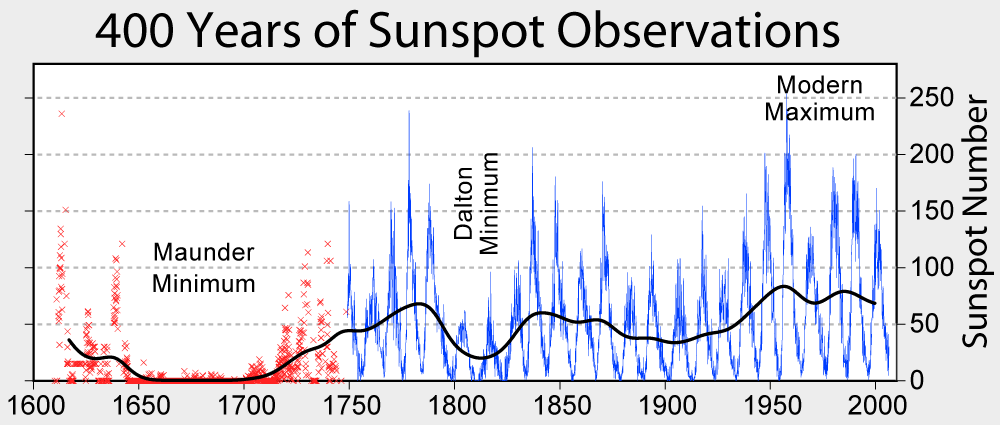
Sunspot frequencies, observed since the year 1600. Almost no sunspots were observed from about 1650 to 1700, a fact first pointed out by the British astronomer Edward Walter Maunder. [Source: Wikimedia]
There are few observations of sun spots before 1600, but it turns out that sunspot frequency is strongly correlated with the cosmic ray intensity at the earth, which in turn, is strongly correlated with the production of the radioactive isotope 14C, the relative abundance of which can be measured with great precision in tree rings. …
Gevraagd naar wat naar zijn oordeel de belangrijkste oorzaken zijn van de opwarming sinds 1850 antwoordt William Happer:
As I have discussed in detail above, I don’t question that the earth has warmed since the end of the Little Ice Age, but I am persuaded that most of the warming was due to natural causes, about which the governments can do nothing. We are already seeing more vegetation on the earth and it is absorbing more CO2.
But as I will discuss in response to your next question, I believe that more CO2 is good for the world, that the world has been in a CO2 famine for many tens of millions of years and that one or two thousand ppm would be ideal for the biosphere. I am baffled at hysterical attempts to drive CO2 levels below 350 ppm, or some other value, apparently chosen by Kabbalah numerology, not science.
Vervolgens gaat Happer in een uiterst technisch verhaal uitvoerig in op de voordelen van een verhoogde CO2 concentratie in de atmosfeer voor de plantengroei, waardoor de wereld de laatste decennia groener is geworden.
Happert:
The following figure by R.J. Donohue, et al., of the Australian Climate Laboratory (“Impact of CO2 fertilization on maximum foliage cover across the globe’s warm, arid environments,” Geophysical Research Letters, 2013, 40: 3031–3035), shows the change in surface vegetation of the Earth from 1982 to 2010 as plants have responded to the modest increase of CO2 from about 340 ppm to 400 ppm during the satellite era.
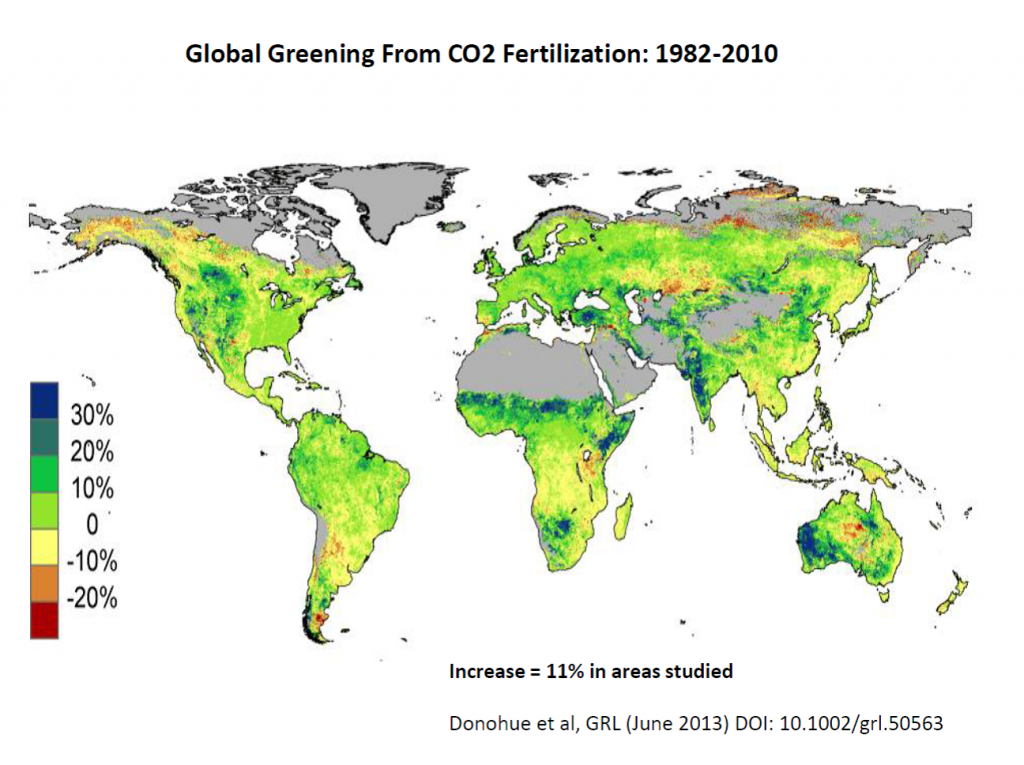
Greening of the earth between 1982 and 2010 from the increase in CO2. [Source: Geophysical Research Letters]
Most of the areas showed a net greening, giving an overall increase of 11 percent.
Gevraagd naar zijn opvatting over de zogenaamde ‘consensus’ antwoordt Happer:
Consensus supporters don’t like to admit it, but the situation is getting perilously close to Lysenkoism. Lysenko was a poorly educated agricultural extension agent from Ukraine who gained complete control over biology in the USSR, with the full backing of the Politburo and the personal support of both Stalin and Khrushchev.
As for consensus in science, no one could be more eloquent than Michael Crichton in his lecture, “Aliens Cause Global Warming“ (PDF), at the California Institute of Technology in 2003:
I want to pause here and talk about this notion of consensus, and the rise of what has been called “consensus science.” I regard consensus science as an extremely pernicious development that ought to be stopped cold in its tracks. Historically, the claim of consensus has been the first refuge of scoundrels; it is a way to avoid debate by claiming that the matter is already settled. Whenever you hear the consensus of scientists agrees on something or other, reach for your wallet, because you’re being had.
Let’s be clear: the work of science has nothing whatever to do with consensus. Consensus is the business of politics. Science, on the contrary, requires only one investigator who happens to be right, which means that he or she has results that are verifiable by reference to the real world.
In science consensus is irrelevant. What is relevant is reproducible results. The greatest scientists in history are great precisely because they broke with the consensus.
There is no such thing as consensus science. If it’s consensus, it isn’t science. If it’s science, it isn’t consensus. Period.
Vervolgens legt de interviewer de volgende vier vragen aan Happer voor:
• Is concerted governmental action at the global level desirable?
• If so, what principle of equity should determine that action?
• When the stakes are very high and a broad scientific consensus is in place, should critics of the mainstream view nevertheless be entitled to express their views freely?
• Is political advocacy by scientists a good thing in the first place?
William Happer
Is concerted governmental action at the global level desirable? No. More CO2 will be good for the world, not bad. Concerted government action may take place anyway, as has so often happened in the sad history of human folly. …
If so, what principle of equity should determine that action? No action should be taken on CO2. But I enthusiastically support action on real pollution of air, land, or water, by fly ash, oxides of sulfur, and nitrogen from careless coal combustion, or water pollution by careless use of fertilizers and pesticides, or plastic debris in the oceans from human slovenliness. I regard the war on the responsible use of coal and other fossil fuels as deeply immoral. It will impoverish most people by raising the cost of energy. It will enrich crony capitalists who have government backing to force people to buy their inefficient, costly, unreliable windmills and solar farms.
When the stakes are very high and a broad scientific consensus is in place, should critics of the mainstream view nevertheless be entitled to express their views freely? Yes! This is the no-brainer answer for a free society, which I and many others will fight for, as our forefathers did.
Is political advocacy by scientists a good thing in the first place? Yes! Scientists should be free to advocate on any side of a controversial issue.
Vervolgens stelt de interviewer de vrijheid van meningsuiting aan de orde:
Next is the issue of freedom of speech. You of all people do not need us to tell you that the public conversation on global warming has taken on a decidedly nasty tone. Overt bullying and intimidation are now the order of the day. Most recently, U.S. Senator Sheldon Whitehouse (D-RI) called for the RICO Act against racketeering to be used to prosecute critics of the IPCC consensus!
One of the frequent charges (one you are not unfamiliar with personally) is that consensus critics are in the pay of the oil and gas industry. Such critics — nearly all of whom work for government in one form or another — do not often stop to consider that they, too, serve someone’s economic interests (as do we all in a society founded upon the free exchange of goods and services).
Given this “parity” of interests between consensus critics and supporters, what do you make of the situation? Isn’t the freedom to think what we like and say what we think at the very heart of the scientific endeavor? If so, then how did we get ourselves into this fix?
William Happer:
It is not possible to make progress in science without controversy. For example, there was heated scientific debate over Alfred Wegener’s theory of continental drift for decades. …
What is different about the global warming controversy is the direct involvement of governments on one side. As you mention, congressional demands that racketeering charges be brought against climate skeptics are unprecedented in the USA, although this does have an ominous precedent in the Lysenkoism that we mentioned above.
Bernie Sanders says he will “bring climate deniers to justice” when he becomes President of the USA. What should people like me expect from President Sanders — a concentration camp? The firing squad?
And what ever happened to the First Amendment to the US Constitution? …
During Stalin’s Great Terror, the equivalents of evil fossil fuel interests were Leon Trotsky and his followers. They were a direct threat to Stalin’s control of the world-wide Communist movement, just as climate skeptics are regarded as an existential threat to the global warming establishment.
I would be surprised if the net total funding of climate skeptics exceeded $2 or $3 million dollars a year, and even that may be high. In the last few years, US government spending for climate research (PDF) has been about $20 billion dollars a year — more than a thousand times greater than skeptic funding. But even this huge financial advantage is not sufficient to support the pathetically weak scientific case that the world is in danger from more CO2.
De interviewer informeert vervolgens of wetenschappers zich volgens Happer zo intensief met de politieke discussie mogen bezig houden als nu gebeurt bij het klimaat.
William Happer
I think that great damage has been done to the reputation of all of science by the global-warming frenzy of the past few decades. Twenty years ago, supposedly expert scientists solemnly declared that our children and grandchildren would not know what snow is. A few weeks ago, Washington, DC, struggled to dig out of three feet of snow, a record in many locales.
In accepting his 2007 Nobel Peace Prize (also won by Yassir Arafat), Al Gore said the summer Arctic could be ice-free by 2013 due to CO2 emissions. I invite readers to have a look at the data site I mentioned earlier. A few minutes of inspection of the “sea ice” link will show that there has been no significant change in sea ice since 2007. With all due respect to Nobel Laureate Gore, there was plenty of summer ice in 2013.
I hope that when the global-warming scandal is finally behind us, science will be forgiven for letting it fester so long. It took decades for Soviet biology to recover from the damage done by Lysenkoism.
Vervolgens vraagt de interviewer wat Happer de vijf belangrijkste argumenten vindt tegen de ‘consensus’ opvatting.
William Happer
• Climate models have predicted far more warming than has been observed …
• The consensus has largely ignored the huge positive effects of more CO2 …
• The large temperature changes of the Medieval Warm Period and the Little Ice Age occurred before the widespread use of fossil fuels after the industrial revolution …
• There is a strong correlation of temperature with solar activity ….
• Frenzied, ad hominem attacks on credible opponents show that consensus supporters have a very weak scientific case. You don’t need potentially counterproductive ad hominem attacks if you have strong scientific arguments.
Aldus William Happer.
Zie verder hier.
Zoals eerder opgemerkt is William Happer onlangs bij ‘president-elect’ Donald Trump op bezoek geweest. Ik neem aan dat daarbij de hoofdlijnen van bovenstaand interview de revue zijn gepasseerd. Ik neem eveneens aan dat deze boodschap er bij Trump inging als Gods woord in een ouderling.
Vele jaren geleden ben ik zelf ook met een gelijkluidende boodschap bij vooraanstaande Nederlandse politici op bezoek geweest. Helaas heb ik moeten constateren dat deze bezoeken geen enkel merkbaar effect hebben gehad. Een kongsi van ideologisch klimaat/milieubevlogenen, politici die een groen voetje willen halen bij de milieubeweging, klimaatactivistische wetenschappers, financiële belangen bij duurzame energie en ten slotte de policor media, heeft een beslissende invloed gehad op de totstandkoming van een jaarlijks vele miljarden verslindend klimaatbeleid, dat geen enkel aantoonbaar effect op de wereldtemperatuur zal hebben, en waarbij de niet geraadpleegde burger het gelach zal moeten betalen.
In schril contrast daarmee lijkt het mij waarschijnlijk dat het klimaatbeleid in de VS op korte termijn een U-bocht zal maken. De vraag is hoe lang het zal duren voordat Europa, inclusief Nederland, het Amerikaanse voorbeeld zal volgen. Ik vrees dat dat nog lang kan duren. Het gaat hier immers om een pseudo-religie, waarbij rationele argumenten afglijden als water van het verenpak van een eend. Maar het lijkt mij aannemelijk dat de beeldenstorm ook hier uiteindelijk niet zal uitblijven.
 Misschien is dit het begin? (‘Waarom intellectuelen zo graag wereldrampen voorspellen’)
Misschien is dit het begin? (‘Waarom intellectuelen zo graag wereldrampen voorspellen’)
Voor mijn eerdere bijdragen over klimaat en aanverwante zaken zie hier, hier, hier, hier en hier.



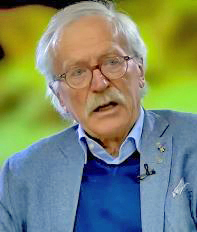


Ha, Frits Bolkestein op bezoek geweest bij de Groene Rekenkamer?
http://www.elsevier.nl/kennis/blog/2017/01/waarom-intellectuelen-zo-graag-wereldrampen-voorspellen-436737/?cmpid=NLC|elsevier_dagelijks|2017-01-19|Waarom_fungeren_intellectuelen_zo_vaak_als_klimaatalarmisten?&utm_source=TripolisDialogue&utm_medium=email&utm_term=&utm_content=&utm_campaign=els_19jan17&cmpid=NLC|els_19jan17|2017-01-19
Wat een held, deze William Happer. En jij ook Hans. Overigens lees ik in de link naar de Washington Post dat ook Al Gore bij Trump op bezoek is geweest. Het blijft bij Trump natuurlijk de vraag of hij werkelijk een authentiek eigen beleid gaat voeren, of dat hij toch ook maar een uitvoerder is van de werkelijk macht die wij niet te zien krijgen, en inderdaad een boel verwarring aan het zaaien met nog een voor ons nog onduidelijk doel. Dat klinkt waarschijnlijk complotterig, maar goed, we kunnen alleen maar afwachten.
Sinds ik deze zaken lees en toch bijna 100% overtuigd begin te raken van de klimaatzwendel vraag ik me af: hoe raak je de snaar bij mensen dat ze “om” willen. Of is dat helemaal niet im frage, gezien alle belangen die Hans noemt en die verdedigd moeten worden. Maar los daar van, moeten we het daar met z’n allen niet eens over hebben? Want met het welles-nietes verhaal komen we er niet. We zouden naar een soort win-win situatie moeten waarbij de partijen toch met beperkt gezichtsverlies hier uit kunnen komen. Of het moet op een of andere hardhandige manier gebeuren. Of we gaan inderdaad naar een planeconomie, controlestaat. Kijk maar eens in de “maatregelenlijst” van de CO2 prestatieladder http://www.skao.nl/maatregellijst waar steeds meer bedrijven aan meedoen– min of meer gedwongen om opdrachten te kunnen verwerven, en toch min of meer in een keurslijf worden geperst. Ik krijg er steeds meer moeite mee om dit binnen mijn bedrijf te moeten coördineren. Waar ik betrokken ben bij het milieu en mijn leefomgeving is dat inderdaad meer met de werkelijke milieuvervuiling die ook in het stuk worden genoemd. Maar de nadruk lijkt steeds meer op die CO2 komen te liggen. En volgens Happer moeten we juist naar 2000 ppm…kan ik niet beoordelen, maar de voormalig oprichter van Greenpeace gaf een dergelijk geluid ook al af..
Ik vind die 10 pagina’ s tekst in de Elsevier van deze week een opsteker. Vooral ook over de vergroening van de aarde. Het zal ook mensen voorlichten die niet op Climategate.nl kijken. Bemoedigend.
@David Ja, mooi hè. Zitten we niet niet voor niets verhalen te schrijven en sommetjes te maken.
Ja zo gaat dat nu eenmaal, het belangrijkste is WIE het zegt.
Ik vond zijn refereren aan Lysenkoïsme treffend. Ook de uitspraken van Sanders zijn allesbehalve geruststellend. Die hoogmoed en zelfingenomenheid leunen tegen het totalitaire aan. In het artikel in Elsevier worden ook dergelijke voorbeelden genoemd wat betreft de pers. Zo verklaarde Hank Hagoort, voormalig baas van de NPO, dat hij geen objectieve verslaglegging wil over het klimaat, omdat de Nederlandse politiek feller op moet treden. Zo valt dus het masker af, wat overigens al veel langer vermoed werd. We kunnen dus constateren dat de AGW-hypothese 1) geen nulhypothese kent, dus geen wetenschappelijke basis heeft, 2) geen consensus kent, anders dan berustend op bedrog, 3) ook vanwege de hockeystickgrafiek op onjuiste statistiek berust, 4) in leven wordt gehouden door het bedrog door MS-media van de tot betalen gedwongen burger, 5) een element in zich draagt om andersdenkenden te intimideren (Elsevier maakt in het artikel melding van een aantal gevallen w.o. Happer en Curry)
Ik kan slechts concluderen dat ik blij ben om in moreel opzicht alleen al, aan de goede kant te staan, die van sceptici.
Wegens technische moeilijkheden namens Jeroen Hetzler.
Ik vond Happer’s refereren aan Lysenkoïsme treffend. Ook de uitspraken van Sanders zijn allesbehalve geruststellend. Die hoogmoed en zelfingenomenheid leunen tegen het totalitaire aan. In het artikel in Elsevier worden ook dergelijke voorbeelden genoemd wat betreft de pers. Zo verklaarde Hank Hagoort, voormalig baas van de NPO, dat hij geen objectieve verslaglegging wil over het klimaat, omdat de Nederlandse politiek feller op moet treden. Zo valt dus het masker af, wat overigens al veel langer vermoed werd.
We kunnen dus constateren dat de AGW-hypothese 1) geen nulhypothese kent, dus geen wetenschappelijke basis heeft, 2) geen consensus kent, anders dan berustend op bedrog, 3) ook vanwege de hockeystickgrafiek op onjuiste statistiek berust, 4) in leven wordt gehouden door het bedrog door MS-media van de tot betalen gedwongen burger, 5) een element in zich draagt om andersdenkenden te intimideren (Elsevier maakt in het artikel melding van een aantal gevallen w.o. Happer en Curry)
Ik kan slechts concluderen dat ik blij ben om in moreel opzicht alleen al, aan de goede kant te staan, die van sceptici.
Een jaartje geleden heb ik mijn abonnement op Else4 opgezegd met oa als reden dat ze geen partij bieden tegen de miljardenverspilling van de klimaathysterie.
@ David.
Lees het losse nummer van deze week eens.
Ga ik halen.
“Intellectuelen” blinken uit in het onderwijs. Maar daarna merken ze in het werkende leven dat geld verdienen nog ander kwaliteiten vereist. Dat is frustrerend zodat ze ijveren om de wereld in te richten zoals een schooltje: een totalitair en collectivistisch systeem.
Hans, ik moest even glimlachen om die 5 laatste punten van Happer, de consensus onder sceptici.
– klimaatmodellen hebben meer opwarming voorspelt dan de metingen aangeven. Lijkt me duidelijk. Maar veel meer? TCR volgens de modellen 1.8, volgens metingen 1.3-1.6. Daarnaast geeft een model met de nu bekende forceringen (zwakke zon…) en dominantie van La Nina in de 2000s niet zo veel verschil met de metingen. En met 2015 en 2016 oppervlakte-temperatuur is het verschil al helemaal klein.
– de positieve aspecten van CO2 komen van de “consensus” literatuur. De relevante passages uit het IPCC hebben het bij opbrengst van gewassen vaak over de balans tussen die aspecten en mogelijke negatieve effecten vanwege klimaat. Maar wellicht heeft Happer hier wel een punt.
– Happer’s grafiek geeft zelf al aan dat de natuurlijke variatie tijdens de kleine ijstijd / middeleeuwse warme periode minder is dan wat we nu hebben. Jammer alleen dat zijn grafiek 50 jaar geleden eindigde, zou hij die erbij hebben gezet dan zou zijn punt gelijk al loos gebleken zijn.
– Goede relatie tussen zon en temperatuur. Huh? Goede negatieve relatie de laatste decennia zal je bedoelen!
– Laatste punt heeft hij vast gelijk in, er wordt veel met modder gegooid, beide kanten op. Jeroen hierboven bijvoorbeeld geeft al aan dat de mainstream moreel inferieur is, bedankt.
Feit blijft dat Happer’s punten gewoon niet zo sterk zijn als ze op het eerste gezicht lijken
Guido,
Je schreef: Hans, ik moest even glimlachen om die 5 laatste punten van Happer, de consensus onder sceptici.
— klimaatmodellen hebben meer opwarming voorspelt dan de metingen aangeven. Lijkt me duidelijk. Maar veel meer? TCR volgens de modellen 1.8, volgens metingen 1.3-1.6. Daarnaast geeft een model met de nu bekende forceringen (zwakke zon…) en dominantie van La Nina in de 2000s niet zo veel verschil met de metingen. En met 2015 en 2016 oppervlakte-temperatuur is het verschil al helemaal klein.
Reactie: Daar is veel over geschreven. Zie bijvoorbeeld hier:
https://judithcurry.com/2015/12/17/climate-models-versus-climate-reality/
Het verschil tussen modellen en realiteit lijkt mij groot en groeiend.
— de positieve aspecten van CO2 komen van de “consensus” literatuur. De relevante passages uit het IPCC hebben het bij opbrengst van gewassen vaak over de balans tussen die aspecten en mogelijke negatieve effecten vanwege klimaat. Maar wellicht heeft Happer hier wel een punt.
Reactie: Klimaatalarmisten negeren in de regel de positieve effecten van CO2. Het komt wel meer voor dat zij bevindingen van de onderliggende analyses van het IPCC negeren. Dat geldt bijvoorbeeld ook voor weersextremen als gevolg van de opwarming. Welke opwarming? Die van 19 jaar geleden? Het IPCC heeft in zijn SREX-rapport geen trends in weersextremen kunnen ontdekken en al helemaal geen correlatie met CO2.
— Happer’s grafiek geeft zelf al aan dat de natuurlijke variatie tijdens de kleine ijstijd / middeleeuwse warme periode minder is dan wat we nu hebben. Jammer alleen dat zijn grafiek 50 jaar geleden eindigde, zou hij die erbij hebben gezet dan zou zijn punt gelijk al loos gebleken zijn.
Reactie: Happer’s grafiek? Misschien bedoel je die van Loehle et al? Het verschil tussen de Middeleeuwse warmteperiode en de Kleine IJstijd is 1,2 graden Celsius (als ik mij niet vergis). Volgens de metingen met thermometers zou die volgens de mainstream de opwarming sinds 1850 zo’n 0,8 graden Celsius bedragen. Daarbij dient te worden aangetekend dat de historische temperatuurreeksen (ruwe data) vaak zijn aangepast/gecorrigeerd/gehomogeniseerd, zodanig dat de opwarming sterker is geworden dan wat uit de ruwe data blijkt. Vele kritische wetenschappers vertrouwen de nieuwste reeksen dan ook niet.
— Goede relatie tussen zon en temperatuur. Huh? Goede negatieve relatie de laatste decennia zal je bedoelen!
Reactie: Ik denk dat je je vergist. Als dat niet zo is, hoor ik het wel van je.
Zie: http://www.kaltesonne.de/eine-kleine-sensation-von-der-presse-unbemerkt-sonnenaktivitat-erreichte-im-spaten-20-jahrhundert-doch-maximalwerte/
— Laatste punt heeft hij vast gelijk in, er wordt veel met modder gegooid, beide kanten op. Jeroen hierboven bijvoorbeeld geeft al aan dat de mainstream moreel inferieur is, bedankt.
Reactie: Ik vermoed dat Jeroen toen hij dat neerschreef niet aan jou dacht. Jouw bijdragen hier worden zeer gewaardeerd. Ik neem aan dat Jeroen daar ook zo over denkt.
Feit blijft dat Happer’s punten gewoon niet zo sterk zijn als ze op het eerste gezicht lijken.
Reactie: Dat is geen feit maar een subjectief oordeel. Maar los daarvan, de kwalificatie ‘niet zo sterk als ze op het eerste gezicht lijken’ als oordeel van iemand die zichzelf tot de mainstream rekent, lijkt mij toch een mooi uitgangspunt voor een verdere vruchtbare dialoog.
Hoi Hans, bedankt voor je uitgebreide reactie. Ik zie dingen toch wat anders ☺
Over het verschil tussen modellen en metingen is inderdaad veel geschreven en tegenover de grafiek waar jij naar verwijst staan er tallozen die een ander beeld laten zien. En als de modellen te hoog zouden zitten loopt het verschil uiteraard op. Een spaarrekening met 2% rente wordt ook ieder jaar meer waard dan een met 1% rente maar het verschil in rente blijft 50%. Overigens krijgen we hier ook weer de oude discussie: je verwijst naar een site waar je het fundamenteel mee oneens bent zo gauw het constructief wordt.
Misschien zou je “lijkt mij groot en groeiend” kunnen kwantificeren, dat helpt vaak enorm in dit soort discussies.
Positieve aspecten van CO2: jij vindt dat alarmisten slecht bezig zijn omdat ze de positieve aspecten niet van het IPCC overnemen. Vind je het dan niet vreemd dat jij alle negatieve aspecten volledig naast je neerlegt?
Temperatuur: de grafiek van Loehle en McCulloch (inderdaad, bedankt!) geeft een verschil van een kleine 1 graad tussen LIA en MWP. Misschien 1.2 als je het onderste uit de kan wil halen. Warme middeleeuwen 0.4 graden warmer dan het gemiddelde over de hele periode. En het eindigt in 1935 met +0.1. Volgens de dataset met de minste opwarming zitten we nu dus ruim boven MWP temperaturen.
Beschuldigingen van data-manipulatie horen uiteraard met bewijs te komen, volgens mij zijn alle scripts en onderliggende data vrij toegankelijk. En ik las net dat de groep die het net als jij eerder niet vertrouwde (BEST) nu zegt dat HadCRUT etc. te laag zitten wat opwarming over oceanen betreft.
Begrijp me goed, hier is het laatste woord niet over gezegd, ook ik ben benieuwd wie van UAH, RSS en de grondmetingen uiteindelijk gelijk krijgt.
De zon: in elke grafiek met data van de laatste decennia op de site waar je naar verwijst wordt de zon minder sterk de laatste pakweg 30 jaar (TSI, zonnevlekken). Iedere temperatuur tijdserie heeft over die periode een temperatuurstijging. Wie vergist zich? Die kalte sonne heet niet voor niks zo, de projecties van Vahrenholt stonden niet voor niks al 10 jaar geleden op afkoelen.
Wat Jeroen’s opmerking betreft, daar zullen we maar niet meer woorden aan vuil maken.
Guido
Dank voor je snelle commentaar.
Je schreef: ‘Over het verschil tussen modellen en metingen is inderdaad veel geschreven en tegenover de grafiek waar jij naar verwijst staan er talloze die een ander beeld laten zien.’
Reactie: Ja, maar in alle grafieken die ik ken, is er een groot verschil tussen de trend van modelprojecties en de realiteit, zodanig dat gesteld mag worden dat duidelijk is geworden dat de klimaatmodellen tekortschieten wat betreft de representatie van de realiteit. Voor een econoom is dat niet verrassend. Ik ben opgegroeid/opgeleid in het geloof dat economische modellen steeds beter zouden worden en de economische realiteit steeds nauwkeuriger zouden weten te benaderen. Dat is niet gebeurd. In de jaren zeventig kwam de kentering: de beruchte stagflatie, die onbestaanbaar was in het toen heersende Keynesiaanse paradigma. Het heeft in de economische discipline geleid tot een verlies aan vertrouwen in het toekomstvoorspellend vermogen van economische modellen. Vele mainstream klimatologen geloven nog steeds dat hun klimaatmodellen, afgezien van kleine kortstondige aberraties, in wezen correct zijn. Ik heb er al meer dan tien jaar geleden voor gepleit dat zij hier nu eens mee zouden ophouden en, net zo als wij economen, zouden erkennen, dat dat niet juist is. Maar nee hoor! Waarom zouden ze ook naar een eenvoudig econoom luisteren?
Je schreef voorts: ‘Overigens krijgen we hier ook weer de oude discussie: je verwijst naar een site waar je het fundamenteel mee oneens bent zo gauw het constructief wordt.’
Reactie: Zo’n woord ‘constructief’ past m.i. niet in onze discussie. Dat zijn elementen waar jij het mee eens bent. Dat is een subjectief oordeel. Ik hoef het niet in alles met Judith Curry eens te zijn om per saldo toch veel waardering te hebben voor haar analyses. Maar ik volg haar niet in alles.
Je schrijft: ‘Positieve aspecten van CO2: jij vindt dat alarmisten slecht bezig zijn omdat ze de positieve aspecten niet van het IPCC overnemen. Vind je het dan niet vreemd dat jij alle negatieve aspecten volledig naast je neerlegt?
Reactie: Wat zijn dan die negatieve aspecten? Dramatische opwarming van de aarde? Die vindt niet plaats. Vermindering van de voedselproductie? Die vindt niet plaats? Integendeel! Verlies aan biodiversiteit? Talloze ‘peer-reviewed’ studies wijzen op een vergroening van de aarde – voor een belangrijk deel als gevolg van een hogere concentratie van CO2 in de atmosfeer. Miljoenen klimaatvluchtelingen? Waar verstoppen zij zich?
Je schrijft: ‘Temperatuur: de grafiek van Loehle en McCulloch (inderdaad, bedankt!) geeft een verschil van een kleine 1 graad tussen LIA en MWP. Misschien 1.2 als je het onderste uit de kan wil halen. Warme middeleeuwen 0.4 graden warmer dan het gemiddelde over de hele periode. En het eindigt in 1935 met +0.1. Volgens de dataset met de minste opwarming zitten we nu dus ruim boven MWP temperaturen.’
Reactie: Dit spoort niet met de uitkomsten van het meest recente onderzoek van Vahrenholt et al. en anderen.
http://climategate.nl/2015/12/30/middeleeuwse-warmteperiode-wel-degelijk-warm-en-wereldwijd/
Overigens lijkt het mij niet zo erg belangrijk of de temperatuurpiek in de Middeleeuwse Warmte Periode nu net iets onder of net iets boven de het huidige temperatuurniveau ligt.
Je schrijft: ‘Beschuldigingen van data-manipulatie horen uiteraard met bewijs te komen, volgens mij zijn alle scripts en onderliggende data vrij toegankelijk. Je schrijft: ‘Begrijp me goed, hier is het laatste woord niet over gezegd, ook ik ben benieuwd wie van UAH, RSS en de grondmetingen uiteindelijk gelijk krijgt.
Reactie: Ja, mee eens. Dat moet bewezen worden! Het ís ook bewezen! Zie hier (Easterbrook):
https://www.youtube.com/watch?v=ofXQdl1FDGk
en hier (Heller):
https://www.youtube.com/watch?v=yYXtxS72XyU
Wat de verschillen in meetreeksen betreft denk ik niet dat er een ‘gelijk’ bestaat. Het meten van de gemiddelde temperatuur van een kamer of zaal is al nagenoeg onmogelijk, laat staan die van de atmosfeer van de aarde.
Je schrijft: ‘De zon: in elke grafiek met data van de laatste decennia op de site waar je naar verwijst wordt de zon minder sterk de laatste pakweg 30 jaar (TSI, zonnevlekken). Iedere temperatuur tijdserie heeft over die periode een temperatuurstijging. Wie vergist zich? Die ‘Kalte sonne’ heet niet voor niks zo, de projecties van Vahrenholt stonden niet voor niks al 10 jaar geleden op afkoelen.
Reactie: In mijn perceptie bestaat er nog veel onzekerheid over de rol van de zon. Het valt echter wèl op dat het aantal ‘peer-reviewed’ publicaties over de rol van de zon en andere natuurlijke factoren de laatste jaren explosief is toegenomen. Zie bijvoorbeeld:
http://notrickszone.com/2016/02/16/impossible-to-ignore-in-2015-alone-massive-250-peer-reviewed-scientific-papers-cast-doubt-on-climate-science/#sthash.4QhZ7OGs.5VmU6w7L.dpbs
Kortom: ‘The science is far from settled.’
Wow Hans, dat zijn veel opmerkingen / vragen. Daar gaan we het een keer bij de Chinees over hebben geloof ik, lijkt me leuker. Toch zijn we er voor een deel wel uit denk ik. Het verschil tussen de temperatuur nu en tijdens de MWP doet er niet zo veel toe blijkbaar (jouw woorden) dus dat punt van Happer is nog steeds een zwak argument tegen AGW.
En de link die je gaf naar de artikelen over de zon hebben het vooral over zonnevlekken en gerelateerde grootheden, en goede correlatie met klimaat op verschillende locaties terug in de tijd. Maar die relatie is nu al een paar decennia omgekeerd.
Guido,
Naar mijn gevoel gaat het de goede kant op met onze discussie. Ik sta er voor open om van je kennis als klimaatprofessional te profiteren.
Maar we mogen onze discussie niet helemaal voor onszelf houden, lijkt me. Laat de meelezers er ook van profiteren.
Ja, de ‘Chinees’! Ik hoop dat Arthur binnenkort zover is om ons een uitnodiging te sturen.
“Laat de meelezers er ook van profiteren.”
Mee eens.